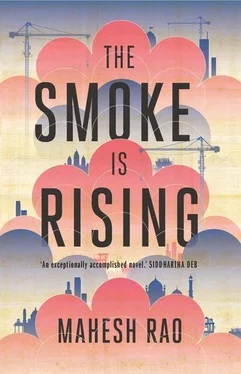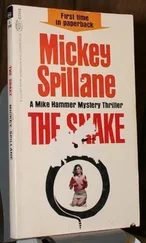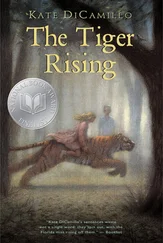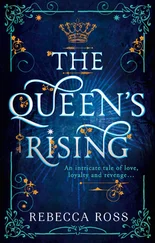On Gulmohar Road the mali paused to wipe his face. He had tried to set off earlier than usual, knowing that his conduct needed to be exemplary over the next few days. Amma’s eyes would be following him continually until she forgot about that missing sack of manure or found something else to occupy her mind. But he had slept badly and was now struggling to make it on time. He began pedalling again, past the large bungalows with their forbidding wrought-iron gates, the Spanish-style villas set in green quads and the corner house shaped like a violin. He finally turned into 7 thMain Road and stopped outside a neat house, smaller than its neighbours, surrounded by a low compound wall.
Knowing he was in full view of the front windows, his features creased into an expression of honest industry. He wheeled the bicycle in through the gates and propped it up against one of the pillars of the carport. It looked like Uma had not arrived yet and so he stayed away from the front and back doors. The gravel on the path leading to the shed looked white in the dazzling sunshine. Deciding not to take on the blaze, he squatted in a small patch of shade under the dining room windows, sluggishly tracing his fingers through the desiccated soil. His days usually began with a steaming coffee, set down in his steel lota by Uma next to one of the sinks by the back door. He leant over the spent blossoms of the hibiscus shrubs. As a bead of sweat from his face dropped on to a bud’s wrinkled lobe, he settled down to wait.

In the master bedroom Susheela inhaled deeply and tried to hoist herself up on her arms, fixing her gaze on the corniced ceiling. Her wrists seemed to be made of moist clay. She renewed her attempt, managed to hold the position for a few seconds, before setting her head back down on the mat. A strange pain had launched itself between her shoulder blades, as if to counterbalance the throbbing circle around her right ankle.
There was a time when she would have taken herself off to see Dr Bhat for any such complaint, even if it meant having to endure his hyperactive receptionist and the jolt of her vigorously hennaed hair. Such frequent visits to the doctor, however, had become embarrassing. Although his manner was always solicitous, he probably assumed that she had little else with which to occupy herself. She recalled their last conversation, which had taken place as the doctor scribbled on a pad.
‘You must think I’m a hypochondriac, doctor, but truly, this cough has not gone for weeks,’ she had said, wishing he would look at her, rather than at his own jerky hand.
‘There is no need for any concern at all, you are absolutely in the pink,’ he had responded, still failing to meet her gaze.
‘But, after all, something must be causing it?’
‘Without a doubt. But you please don’t worry. I am here, no? How are your daughters? Doing well, I hope?’
‘They are doing very well, thank you. They were also a little worried about this cough, you know. They have been pestering me to get it investigated.’
‘Oh yes, good thing that you came to see me. The body is such a complicated instrument, isn’t it? The important thing is to be happy and enjoy a positive outlook. Joyful thoughts, in fact.’
‘Doctor, to be most frank with you, I don’t think my thoughts are more or less joyful than anyone else’s, but not everybody goes around having a strange cough for weeks.’
‘That is true. But in worrying about such matters one forgets that cheerfulness is the true medicine in life. An elixir, in fact.’
Susheela had given up. She had taken his prescription, a tonic that was apparently beneficial for general health and all-round well-being, and left the clinic in a state far removed from the recommended joyfulness.
Apart from the ankle and the shoulder blades, the last three months had also seen the appearance of a patch of dry skin on one thigh and an unaccountable watering of her eyes every time she lay down. Susheela had learned stoicism and a benign neglect. She no longer discussed matters with the Nachappa boy, who was a junior doctor at St Theresa’s, and avoided the temptation of consulting an online compendium of illnesses. Given the array of symptoms, no doubt she would be able to diagnose herself with everything from aphasia to scurvy.
Some aspects of aging were easier to accommodate than others. The trouble, she thought to herself, in her most private moments, was that having had a face once widely acknowledged to be beautiful, one could hardly be expected to make an accurate assessment of its current merits. Just as an old but treasured cardigan would fail to reveal its frayed seams and baggy sleeves to its devoted owner, Susheela had begun to suspect that she had been rendered blind to a number of indignities in her facial appearance.
When she looked at her face she saw a woman who looked perhaps fifty-four rather than sixty-four. She saw good skin, lighter than the matrimonially prized ‘wheatish’, large brown eyes flecked with hazel, a fiercely proportionate nose and a well-defined Cupid’s bow that gently dropped her mouth into a soft vulnerability. She saw a slightly fleshy chin and a deep fold of skin that had somehow nudged its way to the top of her neck. She saw a deep dimple in her left cheek when she smiled and a faint crease radiating out under each eye from the top of her nose.
All this she saw but was this what everyone else saw too? And when they had seen it, what did they make of it? She knew very well that what anyone saw or thought about her looks did not matter ten paise at her age but, in spite of herself, she still felt the need to place herself within an assembly of women of her generation. She pictured a line of dumpy elderly women in shawls and Kanjeevaram silks, chappals slapping against the floor as they walked across a stage, adjusting their sashes and tiaras.
As for her body, on the other hand, there she was perfectly confident that she had not been spared any realisations on the subject of its decline. Over the years it was clear that her hips had widened, apparently seeking to conquer with bulk what could not be conquered by grace. She was conscious of a solidity in her upper arms that she could not remember from her youth. Her stomach, she felt, was a disgrace. Obstinate and insistent, it seemed to pillow around her, taking no notice whatsoever of her hostility. Where had this flesh come from? It was at least fifteen years since Susheela had properly regarded herself as slim but her changed form still took her a little by surprise.
Susheela turned her head to look at the clock on the bedside table. She rolled on to her side and then slowly stood up, feeling between her shoulder blades for the exact source of this new visitation. A short bath later, it seemed to have subsided as she uncoiled the thin cotton towel from around her head. Her hair was still a little wet and had settled in stubborn waves down to her shoulders. Above her ears, Reshmi, her hairdresser, had artfully left a few strands of subtle grey.
‘In all good lies, there must be a little bit of truth,’ Reshmi had pronounced.
The rest of Susheela’s hair proclaimed itself a glossy black. It was a fiction that she felt that she owed to the world and one in which the world ought to collude gratefully. This was not so much a matter of vanity as mutual courtesy. She picked up a comb and began to run it through her hair, wincing as she broke through tangle after tangle. Every day the same: first the right side and then the left, and then sweeping motions over her crown and the back of her head, all culminating in a sad fuzz of jilted hair, plucked from her comb and dropped deftly into the waste-paper basket.
Читать дальше













